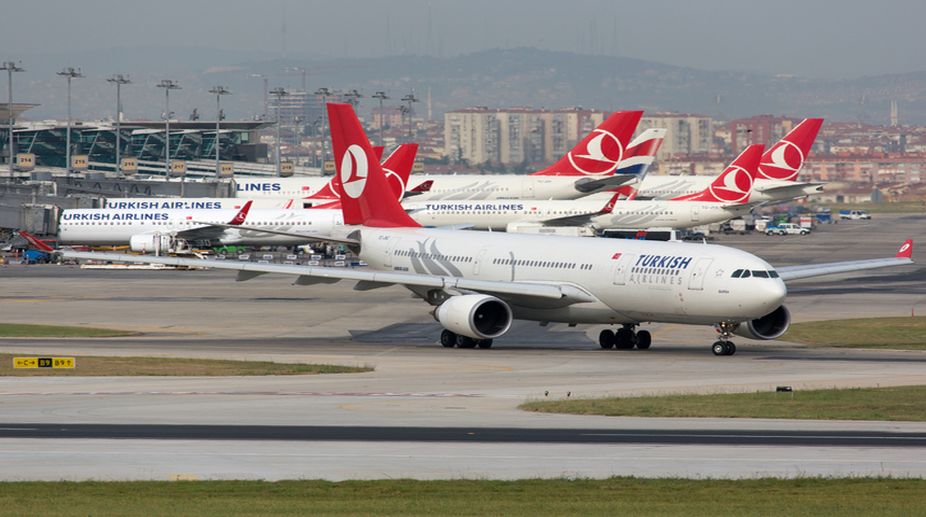Peace, stability in Middle East vital for entire world: EAM Jaishankar
Jaishankar is in South Africa to participate in the G20 Foreign Ministers’ Meeting from February 20-21.

Representational Image (PHOTO: GETTY IMAGES)
In 21 March 2017, the United States announced a ban on electronic devices larger than cell phones from hand luggage on inbound flights from eight countries. Airlines operating non-stop flights from 10 airports in Jordan, Egypt, Turkey, Saudi Arabia, Kuwait, Qatar, Morocco and the United Arab Emirates were told to require passengers to place all electronics save cell phones into their checked luggage.
The ban affects a number of airlines, including, among others, Etihad, Emirates, and Turkish Airlines. The same day, the United Kingdom also imposed a similar ban on electronic items inside passenger cabins on flights to their airports. The UK ban, however, applies to only six countries; it excludes airports in Qatar and the United Arab Emirates and the flag carriers of those countries.
Advertisement
Pakistani airports and airlines are not on either the US or UK ban list. However, since there are few direct flights to the UK and US from Pakistan and most passengers connect to flights in Dubai or Abu Dhabi (subject to the US ban) or Istanbul (subject to both bans) for their onward journey, a large number of Pakistani travellers are likely to be impacted. While they would be able to take their electronics on board flights to Dubai or Abu Dhabi or Istanbul, they would then have to stow them with checked baggage at those airports. This usually requires making an extra trip to a luggage desk later and hoping that the checked items have made it to their destinations.
Advertisement
Unsurprisingly, a lot of travellers heading out to the UK or the US are confused and concerned. Those that arrived in Pakistan for visits prior to the electronics ban have brought along expensive laptops and tablets with them. Like most Pakistani travellers, they are aware of the high incidence of theft of items in checked baggage that takes place in Pakistani airports. Over the years, these incidents of theft have meant that no Pakistani traveller places anything valuable (electronics among them) inside their luggage. Expensive computers, cameras and other electronics as a rule are transported by passengers in their hand luggage even if they will not be used during the flight. It has for decades been the more reliable means of ensuring that the goods are not stolen.
That era is now over. As has been the case in other security measures, such as the ban on liquids more than 100ml, the new ban on electronics is reported to have been prompted by intelligence regarding new plots being hatched by terrorist groups. According to The Guardian, these plots aim to take down an airplane by smuggling a new, undetectable explosive in an iPad or laptop computer.
The terrorist carrying the device would be able to position it in such a way inside the aircraft’s passenger cabin that its detonation would cause the maximum amount of damage and take down the entire plane. A test run for such a plot occurred last year when an explosion on board a Somalian Daallo Airlines jet taking off from Mogadishu blew a hole in the passenger cabin. Experts note that unlike explosives placed in luggage, those in passenger cabins can be controlled by the terrorist, and thus can cause the maximum amount of damage.
The idea of a bomb being set off in the passenger cabin is terrifying indeed. No air traveller wants to consider the possibility of being on a doomed flight with a terrorist carrying an explosives-filled laptop. At the same time, extraordinary horrors are always a little harder to imagine or consider than ordinary inconveniences. In the days since the ban came into effect, Pakistanis who travelled from abroad with all their electronics in tow and in the cabin are left figuring out how to take them back. The already existing ban on shipment of electronics to foreign destinations means they cannot be sent back via courier.
Some are considering travel insurance; others are planning to check them in at the Dubai or Abu Dhabi airports, or relying on the plastic wrap services available at airports that suggest an extra layer of protection. This last strategy may have limited success since bags are put through extra screening procedures before being loaded on US bound flights. These procedures may require the wrap to be opened, something the passenger would not learn until they receive the bag at their final destination. They would also never know if the suitcase was opened during actual screening by security officials or by a thief looking for electronics.
In simple terms, there is no easy way forward. The theft issue is one portion of the pain, the torture, of a long journey without the electronic gadgets most have come to rely on for their own entertainment and that of their children, one likely to be acutely felt. So, too, will the fact that only Muslim countries and hence mostly Muslim travellers are subject to it. The 14-hour flights that people usually have to endure to make it to America are hard enough on the mind and body; now the burden of a special rule imposing a new deprivation will be added to it. Even those who never use electronics on planes, who sleep or read, will be affected, the chorus of crying toddlers left without games and shows for hours inflicting its own pain.
In sum, the electronics ban and the Muslims subject to it are a validation of the logic of collective blame. The possibility that one person, one Muslim travelling from or through one of these countries may have such intentions, has left thousands subject to being treated as suspects, potential terrorists one and all. It may not be fair or just or right, but it is for now, the law.
Dawn/ANN.
Advertisement